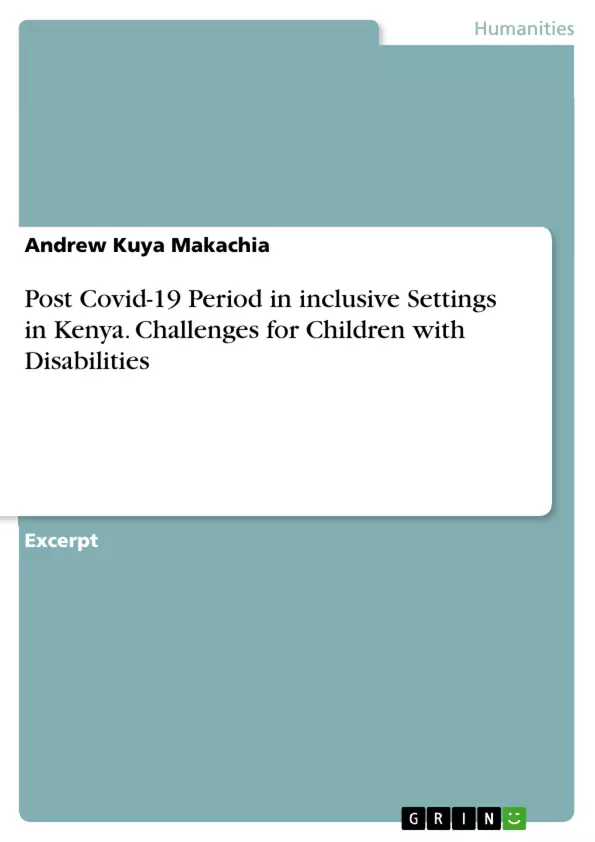The study explores the challenges facing children with disabilities and opportunities arising thereof in inclusive settings during and after the COVID-19 pandemic. The study is based on findings from the library sources and observations are that children with disabilities missed all benefits associated with being in schools such as lack of understanding friends and teachers, regular meals, and emotional stability due to structured school routines. Most children with disabilities perceive school as their second home as they stay there for most of the year. During the pandemic, it was observed that children with disabilities missed assistance of school friends and services of interpreters, transcribers and readers.
In addition, children with disabilities did not benefit from online teaching and learning due to their various forms of disability and diverse needs. There was also no prior preparation before the school closure to train teachers and other staff on how to continue teaching or training children with special needs. To date, there are still challenges facing the regular education systems such as lack of internet connectivity in most areas of the country, inadequate training of teachers, lack of bundles and gadgets necessary to facilitate learning.
Inhaltsverzeichnis (Table of Contents)
- 1.0 INTRODUCTION TO THE STUDY.
- 2.0 CLOSURE OF LEARNING INSTITUTIONS
- 2.1 E-LEARNING PLATFORMS.
- 3.0 SOCIAL/PHYSICAL DISTANCING/KEEPING AT HOME SAFE..
- 4.0 OPPORTUNITIES DUE TO THE COVID 19 PANDEMIC.
Zielsetzung und Themenschwerpunkte (Objectives and Key Themes)
This study explores the challenges faced by children with disabilities and the opportunities arising in inclusive settings during and after the COVID-19 pandemic. It investigates the impact of school closures, e-learning platforms, and social/physical distancing on children with disabilities, while also exploring the potential opportunities for their inclusion.
- Impact of COVID-19 on children with disabilities in inclusive settings
- Challenges faced by children with disabilities during school closures
- Effectiveness of e-learning platforms for children with disabilities
- Social and psychological implications of social/physical distancing for children with disabilities
- Opportunities for improved inclusivity and support for children with disabilities post-pandemic
Zusammenfassung der Kapitel (Chapter Summaries)
The study begins with an introduction that emphasizes the vulnerability of children with disabilities and the heightened challenges they face during the COVID-19 pandemic. The subsequent chapter delves into the impact of school closures on children with disabilities, highlighting the disruption of learning, access to essential services, and increased vulnerability to abuse and neglect. The chapter then examines the effectiveness of e-learning platforms, emphasizing the challenges faced by children with disabilities due to access to technology, lack of accessible materials, and inadequate training for teachers. The final section focuses on the social and psychological implications of social/physical distancing for children with disabilities, outlining the heightened risk of loneliness, isolation, and mental health issues. It also discusses the challenges of accessing essential services, caregivers, and social networks due to these measures.
Schlüsselwörter (Keywords)
The study focuses on the following key concepts: COVID-19 pandemic, children with disabilities, inclusive settings, challenges, opportunities, school closures, e-learning, social distancing, psychological impact, and vulnerability.
Frequently Asked Questions
What are the main challenges for children with disabilities post-COVID-19 in Kenya?
Challenges include the loss of structured school routines, lack of access to interpreters and transcribers, and missing essential services like regular meals.
Why was e-learning difficult for these children during the pandemic?
Difficulties arose from a lack of internet connectivity, inadequate teacher training, and the unavailability of accessible learning gadgets and materials.
How did social distancing affect children with disabilities?
It led to heightened risks of loneliness, isolation, and mental health issues due to the disruption of social networks and caregiver support.
What opportunities emerged from the pandemic regarding inclusion?
The study explores opportunities for improved inclusivity and better support systems post-pandemic as a result of identified gaps.
What was the impact of school closures on their safety?
Closures increased vulnerability to abuse and neglect, as school is often perceived as a "second home" and a safe environment for these children.
- Quote paper
- Andrew Kuya Makachia (Author), 2020, Post Covid-19 Period in inclusive Settings in Kenya. Challenges for Children with Disabilities, Munich, GRIN Verlag, https://www.grin.com/document/937082



